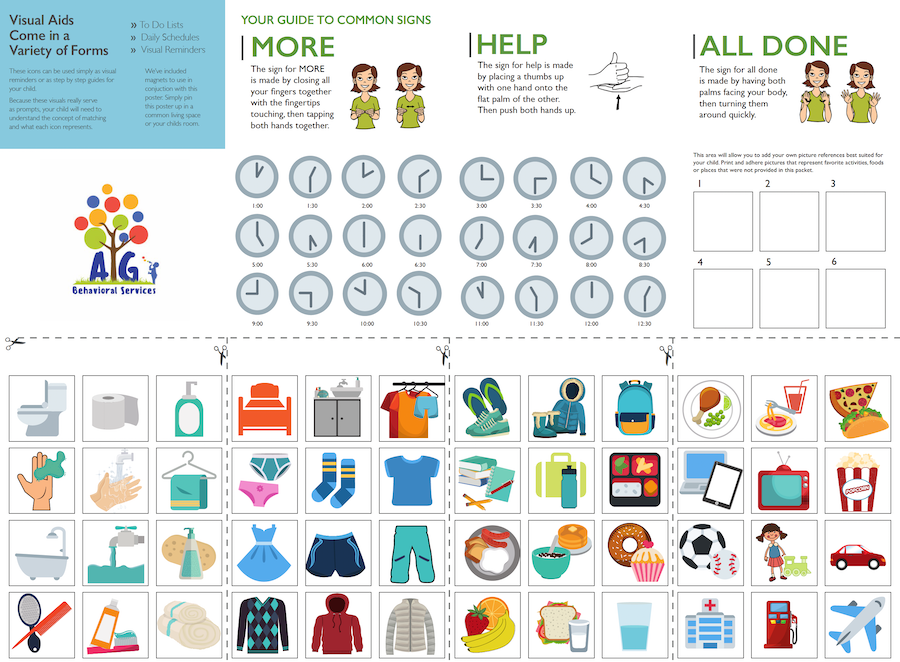AGBS Blog

Preparing for Holiday Family Visits When You Have a Child with Autism
Holiday family visits can be both exciting and challenging, especially when you have a child with autism. The festive season often brings changes to routines, sensory overload, and unfamiliar social interactions. With thoughtful preparation, you can create an environment that ensures a positive holiday experience for everyone involved. Communicate with Your Family 1. Set Expectations: Let your family know about your child’s specific needs and behaviors. Share insights about their triggers, preferences, and how they communicate. Discuss how the holiday activities might

Traveling for the Holidays with Kids on the Autism Spectrum: A Parent’s Guide
The holidays are a time of joy, connection, and celebration, but for families with children on the autism spectrum, holiday travel can feel daunting. The change in routine, sensory challenges, and social demands of travel can create unique stressors. With thoughtful preparation and flexibility, however, holiday travel can be a smoother experience for everyone. Here are practical tips to help your family navigate the season: Traveling for the Holidays with Kids on the Autism Spectrum: A Parent’s Guide 1. Plan Ahead

Surviving in a Social World: Empowering Social Growth for Children with Autism
Social interactions shape our lives from the moment we’re born, but the ability to connect with others doesn’t come naturally to everyone. For children diagnosed with Autism Spectrum Disorder (ASD), developing social skills often requires intentional teaching and modeling. These skills are typically introduced by peers and the adults involved in a child’s life. Since many children aren’t diagnosed with autism until their toddler years, it’s essential to begin modeling social behaviors from the earliest stages of life. From waving

Navigating the Holiday Season with Your Child on the Autism Spectrum
The holiday season can be a magical time of year filled with family gatherings, special events, and traditions. However, for families of children on the autism spectrum, the hustle and bustle of the holidays can also be overwhelming and stressful. With a bit of planning, flexibility, and understanding, you can help your child navigate the season smoothly and even enjoy the festivities. Here are strategies to help you prepare for a rewarding holiday season: Create a Visual Schedule For many

Understanding the Dangers Facing Children with Autism and How to Keep Them Safe
Children with autism face unique challenges that can make them more vulnerable to certain dangers, both inside and outside the home. From wandering off unexpectedly to navigating social situations, it’s important for parents and caregivers to be aware of these risks so they can take proactive steps to ensure the safety of their child. In this post, we’ll explore some of the most common dangers faced by children with autism and offer tips to help keep them safe. Some of

Halloween Tips for Parents of Children with Autism: Making the Spooky Season Fun and Sensory-Friendly
Halloween is a time filled with costumes, candy, and spooky excitement, but for parents of children with autism, it can bring unique challenges. The change in routine, sensory overload, and unfamiliar social interactions can make the holiday overwhelming. However, with a little planning and creativity, Halloween can be a fun and positive experience for everyone in the family. Here are some practical tips to help your child with autism enjoy Halloween in their own way: 1. Start Preparing Early Children

The Impact of Missed ABA Sessions: Strategies to Stay on Course
For families with children on the autism spectrum, Applied Behavior Analysis (ABA) therapy plays a crucial role in helping their child develop important life skills. ABA therapy uses evidence-based methods to improve behaviors, foster communication, and teach daily living skills. However, unanticipated events—like illnesses, family emergencies, or scheduling conflicts—can lead to missed sessions, potentially affecting a child’s progress. In this article, we’ll discuss the impact of missed ABA sessions and offer practical strategies for families to stay consistent with their

The Power of Visual Schedules for Children with Autism: A Guide for Parents
Discover how visual schedules can transform the lives of children with autism. This comprehensive guide offers valuable insights and practical tips for parents seeking effective strategies to support their child’s development. By using visual cues and structure, you can empower your child to navigate daily routines and tasks with greater independence and confidence. Learn how to create personalized visual schedules tailored to your child’s unique needs, and unlock the power of visual aids to enhance communication, reduce anxiety, and promote positive behaviors. Dive into this essential resource and unlock a world of possibilities for your child with autism.

The Importance of Nutrition for Children with Autism: A Path to Better Health and Well-Being
When it comes to supporting children with autism, one area that often gets overlooked is nutrition. Yet, what children eat can play a pivotal role in their overall development, behavior, and well-being. Parents of children with autism frequently seek strategies that can help improve their child’s mood, attention, and health, and nutrition is a key piece of that puzzle. How Nutrition Affects Children with Autism Children with autism spectrum disorder (ASD) often experience unique dietary challenges, such as picky eating,

Empowering Parents: Addressing School Bullying for Children with Autism
Discover how we are empowering parents to tackle one of the most pressing issues facing children with autism: school bullying. Our comprehensive guide provides practical strategies and valuable resources to help protect your child and create a safe and inclusive learning environment. With a focus on understanding the unique challenges children with autism face, we offer expert advice and support to equip parents with the tools they need to effectively address bullying situations. Join us in this mission to ensure every child with autism can thrive academically, socially, and emotionally.

Empowering Families and Diminishing Costs: The Transformative Impact of Early Autism Intervention
Early intervention not only benefits the child but also has profound socio-economic implications. A 2021 study published in JAMA Pediatrics reported that the lifetime cost for a person with autism can range from $1.4 million to $2.4 million. These costs encompass health care, education, ASD-related therapy, family-coordinated services, and caregiver time. Early intervention can significantly reduce these lifetime costs by boosting the child’s independence and reducing the need for intensive support later in life. Early Intervention: Improving Family Dynamics Moreover,

Effective Calming Methods for Children with Autism: A Guide for Parents and Caregivers
Children with autism often experience sensory overload, anxiety, and emotional distress, making it crucial for parents and caregivers to have a repertoire of effective calming methods at their disposal. Applied Behavior Analysis (ABA) therapy offers valuable strategies to help children on the autism spectrum manage their emotions and find a sense of calm. In this blog post, we’ll explore some practical calming techniques that can benefit both children with autism and those who care for them, while also incorporating insights

Research Highlights the Effectiveness of ABA Therapy for Children with Autism
Applied Behavior Analysis (ABA) therapy has a rich history of success in supporting children diagnosed with Autism Spectrum Disorder (ASD). For several decades, ABA has been a well-researched and proven approach aimed at enhancing targeted behaviors, including social skills, communication, and self-care, while simultaneously diminishing maladaptive behaviors that could hinder a child’s development. Recent years have witnessed a surge in studies affirming the effectiveness of ABA therapy in the context of autism. This article will delve into the most recent

Understanding the Benefits of In-Home ABA Therapy versus Center-Based ABA
Applied Behavior Analysis (ABA) therapy is widely recognized as one of the most effective treatments for individuals with autism spectrum disorder (ASD) and other developmental disabilities. When considering ABA therapy, one of the primary decisions families face is whether to opt for in-home sessions or center-based programs. Both options have their merits, but understanding the unique benefits of in-home ABA therapy can help families make informed decisions tailored to their child’s needs. Individualized Environment In-home ABA therapy offers the advantage

The Benefits of Screen Time: How TV Can Support Children with ASD
In recent years, the role of screen time in children’s development has been a topic of much debate. Concerns about excessive screen exposure often dominate discussions, especially when it comes to children with Autism Spectrum Disorder (ASD). However, emerging research suggests that when used purposefully and in moderation, television and other forms of screen time can offer unique benefits for children with ASD. Screen Time – Good or Bad? Understanding Autism Spectrum Disorder is essential in recognizing how screen

Simon’s Story: A Parent’s Tale of Fear, Hope, and Perseverance
How old is your child and when were they diagnosed with ASD? My son, Simon*, is 9. He was diagnosed with Autism Spectrum Disorder when he was 2 ½ years old. When did you sense something was different about your child? I knew something was different when Simon was about 18 months old. We attended Mommy and Me classes together and the other children in the classes were starting to say words. Some were even speaking in sentences. Simon had

Unlocking Joy: The Importance of Play for Children with Autism
In the journey of parenting, every child is unique, and their needs and abilities vary. For parents of children with autism spectrum disorder (ASD), navigating the world of playtime can present unique challenges. However, amidst these challenges lies a profound truth: play is not only important but also essential for the development and well-being of children with autism. Understanding Autism and Play Autism, a complex neurodevelopmental disorder, manifests differently in each individual. Common characteristics include difficulties in social interaction, communication

The Lifeline of Support Groups: Navigating Parenthood with Autistic Children
Parenthood is a journey filled with joy, challenges, and a myriad of emotions. When you’re a parent of an autistic child, the journey can feel even more daunting. The unique needs and experiences of children on the autism spectrum require additional understanding, patience, and support. In this journey, support groups emerge as invaluable lifelines, providing a safe harbor amidst the stormy seas of uncertainty. For Parents Support Groups Can Play an Important Role Autism Spectrum Disorder (ASD) is a complex

Understanding Elopement Dangers and Precautions for Children with ASD
Elopement, or wandering, is a significant concern for families with children on the autism spectrum. It refers to the act of leaving a safe space or supervised area without permission, often without regard for safety. This behavior can pose serious risks to the child’s well-being and can cause immense worry for parents and caregivers. Understanding why children with Autism Spectrum Disorder (ASD) elope, identifying potential causes, and implementing precautionary measures are crucial steps in ensuring their safety. Why Do Children

Exploring Careers in Applied Behavior Analysis: BCBA, RBT, and Behavior Tech
Exploring Careers in Applied Behavior Analysis: BCBA, RBT, and Behavior Tech Applied Behavior Analysis (ABA) is a therapeutic strategy used to improve specific behaviors in individuals, often those with developmental disorders such as autism. This field relies on data-driven techniques to modify behavior, enhancing the quality of life for many. Professionals in this field play different roles, each contributing uniquely to the behavioral improvement of their clients. Let’s explore three key careers in ABA: Board Certified Behavior Analyst (BCBA), Registered
